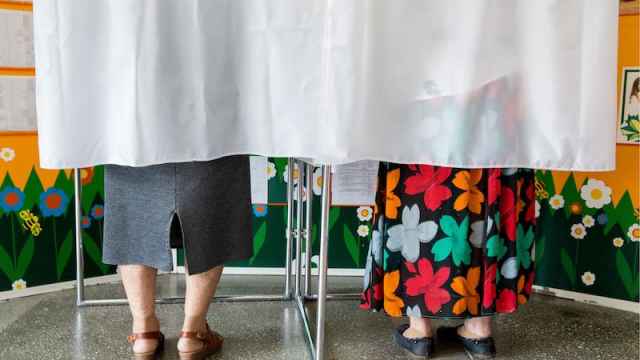Another season of Russian campaign advertisements will wrap up this Friday, ahead of parliamentary elections on Sunday. According to a new report released by the “Golos” independent elections watchdog, this race is shaping up to be Russia’s “dullest” in at least a decade. With voters heading to the polls this weekend, it’s worth looking back at what politicians cooked up in the past month to try to mobilize supporters.
Perhaps indicative of how little the political establishment engaged in this year’s campaigning, Russia’s Central Elections Commission published data this week showing that United Russia — the country’s ruling political party — was outspent by two parties expected to gain far less support from voters: the Liberal Democratic Party of Russia (LDPR) and the Just Russia party. LDPR, which analysts expect to replace the Communists as the number two party in the Duma, invested a whopping 554 million rubles ($8.6 million) in its campaign — almost twice as much as United Russia.
Surprisingly, the political party that spent the fourth most on campaigning was Yabloko (“Apple”), a democratic opposition group that hasn’t won seats in the Duma since before the Putin era. On Sept. 7, Yabloko released an enormously popular advertisement on YouTube, parodying the U.S. tech company whose name is also based on the fruit that keeps doctors away. (The company is Apple. We’re talking about apples.)
In the video, which has nearly 1 million views at the time of this writing, Grigory Yavlinsky unveils a “unique device,” “twenty years in the making”: the pen. Displayed floating seductively in the air, the pen “literally puts the future in your hands,” Yavlinsky says. All voters need to do is get a pen (they come in custom colors!) and vote for Yabloko, naturally. It’s likely no coincidence that the party released this campaign ad on the same day that Apple announced the iPhone 7.
Yavlinsky has come a long way, incidentally. Twenty years ago, in the 1996 presidential race, he ran a very different campaign. His most memorable advertisement involved singing and dancing. A lot of singing and dancing. (Some say it was too much, but maybe the electorate simply wasn’t ready for an 11-minute musical number.)
But Yabloko hasn’t given up music — not entirely. Sergei Mushtenko, one of the party’s Duma candidates, dared to lay down some beats for his constituents. The rap ends on the hopeful lyric: “Tired of getting conned? Take a stand! Let’s do this together. Here’s my hand.”
Yabloko and Yavlinsky aren’t the only ones in Russia today aiming to tickle voters’ funny bones. Dmitry Golovin, a member of the nominally opposition Civic Platform party, is running for re-election to the Yekaterinburg city parliament. In his campaign ad, as testicle-looking pairs of chicken eggs are crushed under a wooden sledgehammer, Golovin conveys one basic message: “Dmitry Golovin is a man with steel … principles.”
In this election, however, nobody has established his own manliness better than Maxim Shingarkin, a candidate from the Rodina party running from the Sverdlovsk region. Whether he’s comparing himself to “battle gloves” or demonstrating his scythe mastery in an open field, Shaingarkin and the mesmerizing floral pattern of his shirt have awed thousands on YouTube.
The Just Russia party, which is struggling to win enough votes to maintain some seats in the Duma, is featuring one of its most colorful candidates in campaign videos: Anatoly Wasserman, a former Ukrainian citizen under investigation in Ukraine for separatist activity. (In January this year, Vladimir Putin granted Wasserman Russian citizenship.) In the ad, Wasserman visits a local government building, looking to talk to a state official, only to find that everyone in the office is a bear. (The mascot for United Russia is a bear.) Finally, unable to locate another human being, Wasserman meets a janitor (played by Olga Epifanova, a current Duma deputy). “Excuse me, are there even any people here?” Wasserman asks her. “And where would they come from? You should have used your head when you voted!” she answers.
Anatoly Aleksashin, another candidate from Just Russia, also tried a playful approach with his campaign ad, dressing as the biker from the opening scene in the 1991 Hollywood film “Terminator 2.” “He’s returned to protect,” the video says in a caption, before cutting to Aleksashin superimposed over a steel mill. The homage is fun, but somebody on the sound-recording team must have buried the microphone in the mud outside before filming, because the audio is lousy. The video's guitar riff — meant to recall George Thorogood and the Destroyers’ “Bad to the Bone” — is a few notes shy of getting the job done, too.
This election cycle has also witnessed some amusing “anti-advertisements” produced to lampoon certain politicians and political parties. One of the most popular such videos targets Valery Rashkin, a Duma candidate from the Communist Party. Evidently modeled on “Voters for Trump,” an SNL parody from March, the ad shows people in different professions, later revealed to be unsavory, endorsing Rashkin.
“Valery Fyodorovich is a creative person. That’s something I get,” a painter tells the camera. “He’s the neatest politician in Russia,” a maid says next. “He’s raising the prestige of blue-collar workers,” a man in a woodshop explains. “And he’s raising teachers’ salaries,” says a woman holding a beaker and wearing a lab coat. “Valery Fyodorovich, we’ll build whole cities!” exclaims a hard-hatted man with a shovel. The video then doubles back to reveal that Rashkin’s endorsements all come from criminals. The maid is covering up a murder, the teacher (in a nod perhaps to the TV show “Breaking Bad”) is packing a suitcase with drugs, and the construction worker is burying a body. “We’re building new homes. Every Russian will get their own, cozy corner,” the worker says, before kicking a corpse into a ditch.
On Sept. 18, all 450 seats in the Duma are up for grabs in a mixed elections system: half the deputies will be elected by party lists (in a proportional system) and the other half will be elected in single-member constituencies (a plurality system).
A Message from The Moscow Times:
Dear readers,
We are facing unprecedented challenges. Russia's Prosecutor General's Office has designated The Moscow Times as an "undesirable" organization, criminalizing our work and putting our staff at risk of prosecution. This follows our earlier unjust labeling as a "foreign agent."
These actions are direct attempts to silence independent journalism in Russia. The authorities claim our work "discredits the decisions of the Russian leadership." We see things differently: we strive to provide accurate, unbiased reporting on Russia.
We, the journalists of The Moscow Times, refuse to be silenced. But to continue our work, we need your help.
Your support, no matter how small, makes a world of difference. If you can, please support us monthly starting from just $2. It's quick to set up, and every contribution makes a significant impact.
By supporting The Moscow Times, you're defending open, independent journalism in the face of repression. Thank you for standing with us.
Remind me later.






